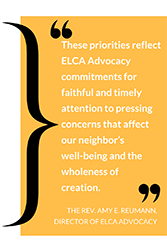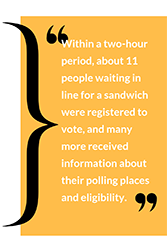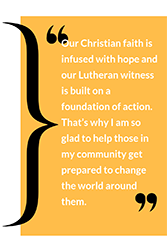Looking ahead, 2020 is likely to be an eventful year. In the midst of societal shifts and opportunities, ELCA Advocacy has identified areas of priority for our work together on the federal level.  “These priorities reflect ELCA Advocacy commitments for faithful and timely attention to pressing concerns that affect our neighbor’s well-being and the wholeness of creation,” says the Rev. Amy E. Reumann, Director of ELCA Advocacy.
“These priorities reflect ELCA Advocacy commitments for faithful and timely attention to pressing concerns that affect our neighbor’s well-being and the wholeness of creation,” says the Rev. Amy E. Reumann, Director of ELCA Advocacy.
Please consider being part of the ELCA Advocacy network for information and notification when your action matters most. Use ELCA.org/advocacy/signup to sign up, and invite your congregation and ministries to do so as well (sharable invitation posts are available on social media @ELCAadvocacy). Find a reproducible copy of 2020 priorities at ELCA.org/resources/advocacy. ELCA Advocacy is a resource in our church to help bring our faith based voices into public policy dialogue as God calls us into the world to serve together.
2020 ELCA ADVOCACY FEDERAL POLICY PRIORITIES
In the ELCA we believe that, through baptism, God is calling us into the world to serve together.
We are a church that views governments as helpful ways God is active in our world and that is energized by lively engagement in our faith and public life. When we, as ELCA members, lift our voices together to influence policies that advance the common good, we further God’s work in our world.
Shaped by the ELCA’s social teaching documents and the experiences of its congregations, ministries and partners, we advocate to end world hunger and stands up for policies that create opportunities to overcome poverty, promote peace and dignity, preserve God’s creation and promote racial justice.
You will find ELCA faith-based advocates meeting with policy makers, taking joint action with values-sharing issue partners, writing letters, making public comments, talking with neighbors, asking questions in town hall meetings — listening, learning, educating and visibly and skillfully asserting policy considerations guided by faith foundations.
In addition to faith-based advocacy organized by local congregations and synods, by Lutheran state public policy offices and by Lutheran Office for World Community representation to the United Nations, ELCA Advocacy is active in Washington, D.C. Following are policy priorities on the national horizon for 2020.
 Civic engagement
Civic engagement
Anticipating the 2020 U.S. presidential election and supporting the church’s #ELCAvotes initiative, ELCA Advocacy will continue to prioritize policy and practice that increases both government inclusion of and civic participation in our communities.
- GO TOs — Find more in ELCA social teaching resources, including the social policy resolution “Voting Rights to All Citizens.”
 Domestic Policy
Domestic Policy
Child nutrition programs — Restore, protect and adequately fund school and community-based feeding programs as part of the federal safety net, and oppose efforts to convert nutrition assistance programs to block grants to states which would over time diminish free and reduced-fee meal benefits.
Criminal justice reform — End mass incarceration, promote fairer sentencing and support restorative reentry programs in our communities through federal and state funding and reforms.
Civil and human rights — Safeguard and promote protections for vulnerable populations, including communities who face barriers, unjust treatment or inequalities on the basis of racial, ethnic, cultural, gender, sexual orientation or class identity.
- GO TOs — Find more in ELCA social teaching resources, including the social policy resolution “Advocating for Child Nutrition,” the social message “Human Rights” and the social statement The Church and Criminal Justice.
 Domestic Policy: Housing
Domestic Policy: Housing
Budget concerns — Foster bipartisan cooperation and public support for budgeting of federal programs that fund affordable housing and assist people who are homeless.
Shelter and housing reforms — Ensure that the experience of churches and faith-based ministries informs federal reforms and public rule revisions that affect low-income housing programs.
Natural disaster impact — Support federal disaster aid resources and equitable access to recovery programs that assist communities before and after natural disasters.
- GO TOs — Find more in ELCA social teaching resources, including the social message “Homelessness: A Renewal of Commitment” and the social statement Sufficient, Sustainable Livelihood for All.
 Environment Policy
Environment Policy
Mitigation, Adaptation and Resiliency — Support legislation and policies that address the global impact of greenhouse gas emissions, incorporating the principles of participation, solidarity, sufficiency and sustainability. Impacts and related policy considerations are multifaceted, including food security threats, agricultural challenges, increased health issues, national security and the forced migration of thousands.
Sustainability — Encourage and advocate for important legislation to protect frontline communities and vulnerable populations that disproportionately experience the negative impacts of environmental degradation, including climate-related changes that exacerbate existing racial, economic, ecological and social injustices.
Creation care strengths of ELCA — Amplify ELCA experiential, educational and creation-care value resources, expressing faithful hope for the future, at this time of pressing and wide-ranging environmental concerns.
- GO TOs — Find more in ELCA social teaching resources, including the social statements Caring for Creation: Vision, Hope, and Justice; Sufficient, Sustainable Livelihood for All; and Genetics, Faith and Responsibility.
 International Policy
International Policy
Federal budget considerations — Advocate for robust support for international antipoverty, humanitarian and global health funding (i.e. HIV/AIDS, malaria), as well as funding for conflict prevention and peace-building programs.
Gender Justice — Strengthen U.S. government capacity to prevent gender-based violence, promote girls’ education, protect women and girls during humanitarian crises, and support the economic and health care needs of women and girls globally.
Peace and Diplomacy — Promote human rights and strengthen conflict prevention and peace-building activities around the world, including bilateral and multilateral initiatives.
- GO TOs — Find more in ELCA social teaching resources, including the social statements For Peace in God’s World and Faith, Sexism, and Justice.
 Migration Policy
Migration Policy
Plight of children, women and men fleeing the Northern Triangle of Central America — Raise awareness of the challenges and humanitarian stories on the United States’ southern border.
Human rights of migrants — Restore, protect and promote the human rights of those fleeing violence, poverty, environmental degradation or food insecurity, to name a few causes, and urge the relevant governments and ad hoc institutions to protect migrants, refugees and asylum seekers as established under international law, by denouncing policies and practices that exacerbate the risks and discrimination these populations face.
Militarization of foreign aid — Organize against the allocation of funds to militarize the U.S. southern border and the development of practices that compromise the human rights of migrants.
Path to citizenship — Support policy that reinforces Temporary Protected Status (TPS) and Deferred Action for Childhood Arrivals (DACA).
- GO-TOs — Find more in ELCA social teaching resources, including the social messages “Immigration,” “Human Rights” and “Gender-based Violence.”
How can you get involved?
Become part of the ELCA Advocacy network at ELCA.org/advocacy/signup! You will receive monthly updates on policy activity and be invited to take action at moments when your voice and experience will have an impact.
Find resources for your advocacy efforts at ELCA.org/resources/advocacy and a community with which to engage on social media at @ELCAadvocacy. Together we endeavor to live into our baptismal covenant to serve all people, following the example of Jesus, and to strive for justice and peace in all the earth.












